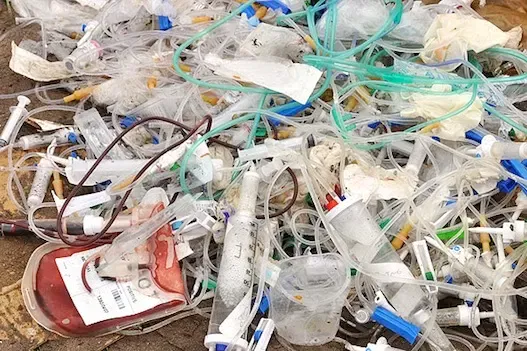CSIR-NIIST Unveils Technology to Transform Biomedical Waste into Soil Enhancements

Synopsis
Key Takeaways
- CSIR-NIIST introduces 'Sṛjanam' for biomedical waste.
- The technology disinfects and converts waste into soil additives.
- It minimizes human intervention and health risks.
- India generates 743 tonnes of biomedical waste daily.
- Research shows treated waste exceeds organic fertilizers in quality.
New Delhi, Feb 8 (NationPress) The CSIR-NIIST (National Institute for Interdisciplinary Science and Technology) in Thiruvananthapuram has introduced an automated system for transforming biomedical waste into useful soil additives. This innovative rig, named “Sṛjanam”, will be officially launched by Union Minister for Science and Technology, Dr. Jitendra Singh, during an event at AIIMS, New Delhi on February 10.
The rig effectively disinfects hazardous biomedical waste, including blood, urine, sputum, and laboratory items, without relying on expensive and energy-consuming incinerators. Additionally, it neutralizes unpleasant odors from toxic waste.
According to Dr. C Anandharamakrishnan, Director of CSIR-NIIST, “Our technology has the potential to convert processed waste into valuable soil enhancers with minimal human involvement, offering a safer alternative for healthcare facilities. This innovation reduces the risks of spills and occupational exposure while helping to curb the uncontrolled spread of infectious microbes.”
Research indicates that the processed biomedical waste outperforms traditional organic fertilizers such as vermicompost. The Central Pollution Control Board (CPCB) reported that India generates approximately 743 tonnes of biomedical waste daily, creating a substantial challenge for effective management and disposal.
Improper disposal practices, including inadequate segregation, open dumping, and incineration, pose serious health risks by releasing harmful carcinogens, particulate matter, and ash residues.
The rising volume of biomedical waste necessitates enhanced transportation methods, which increases the potential for accidents and spills. This new prototype, capable of handling 400 kg daily, will initially process 10 kg of degradable medical waste each day.
Once validated, this technology will be prepared for large-scale implementation upon approval from relevant authorities.
With this advancement, CSIR-NIIST aims to provide an innovative, cost-effective, and environmentally friendly method for the disposal of hazardous biomedical waste.








